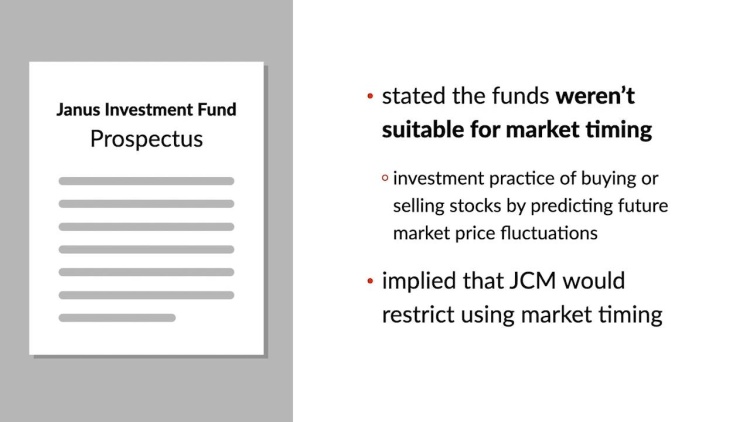Janus Capital Group, Inc. v. First Derivative Traders
United States Supreme Court
564 U.S. 135 (2011)

- Written by Sara Rhee, JD
Facts
Janus Capital Group, Inc. (JCG) (defendant) created the Janus Investment Fund (JIF), a family of mutual funds legally distinct from JCG. Janus Capital Management LLC (JCM) (defendant) provided investment advisory services to JIF. All officers of JIF were officers of JCM. In accordance with legal requirements, JIF issued prospectuses for several of its funds. These prospectuses stated that market timing was not a proper practice for the funds and implied that JCM would seek to restrict it. In September 2003, the New York State attorney general filed a complaint alleging that JCG had made secret arrangements to allow market timing for several of the funds managed by JCM. Consequently, investors withdrew money from JIF mutual funds, causing JCG a significant loss of income. First Derivative Traders (First Derivative) (plaintiff) brought suit against JCG and JCM on behalf of other owners of JCG stock. The complaint alleged that JCG and JCM violated Securities and Exchange Commission Rule 10b-5 by issuing mutual-fund prospectuses containing misleading statements. The district court found that First Derivative failed to state a claim that JCM made the misleading statements and dismissed the complaint. The United States Court of Appeals for the Fourth Circuit reversed. The Supreme Court granted certiorari.
Rule of Law
Issue
Holding and Reasoning (Thomas, J.)
Dissent (Breyer, J.)
What to do next…
Here's why 907,000 law students have relied on our case briefs:
- Written by law professors and practitioners, not other law students. 47,100 briefs, keyed to 996 casebooks. Top-notch customer support.
- The right amount of information, includes the facts, issues, rule of law, holding and reasoning, and any concurrences and dissents.
- Access in your classes, works on your mobile and tablet. Massive library of related video lessons and high quality multiple-choice questions.
- Easy to use, uniform format for every case brief. Written in plain English, not in legalese. Our briefs summarize and simplify; they don’t just repeat the court’s language.





